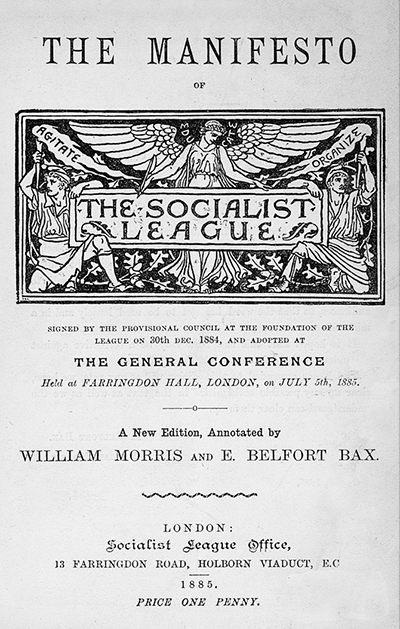William Morris was greatly troubled by the income disparities and inequities that he came across in the Victorian Society. This is what motivated him to join the Social Democratic Foundation in 1883. At the time, this was the only officially recognized socialist party in existence in England.
As was the case with many other people who had joined this particular movement, Morris was unable to clearly define his vision. This was amidst all the other views being put forward on how an ideal organization should be like. On his part, Morris advocated for radical changes and revolution via government reforms at different stages of his adult life. In 1884, Morris came together with Karl Marx' daughter, Eleanor, and together with other prominent members of the Social Democratic Foundation party broke away to form the Socialist League.
The Socialist League: 1884—1889
Morris, together with other defectors from the SDF founded the Socialist League in December 1884. The Socialist League manifesto was composed by Morris in collaboration with Bax. In the manifesto, they sought to describe the position of their new party as being representative of a Revolutionary International Socialism.
The manifesto largely advocated for world revolution and proletarian internationalism. It did this while attempting to reject the notion of having socialism in a single country. With this regard, he made a commitment to nurture socialists in the society by agitating, organizing, and educating the society to help create a strong and viable socialist movement. William Morris called on activists to start boycotting national elections. His belief was that socialist would gladly take part in a revolution (proletariat), that would, in turn, go a long way towards the creation and establishment of a strong socialist society. He got to learn more about Marxism from Bax.
Bax is also the one who introduced him to Friedrich Engels, one of Marx's foremost collaborators. After the introduction, Engels said that Morris was honest, but lacked the practical skills that were needed to assist in leading a proletariat revolution. During this time, he continued to communicate with the other members of the sector. He also happened to be a regular at the International Club, located in Shoreditch, in the East London region. The club was well-known for helping advance the socialist agenda. But even as this happened, he was cautious not to be seen embracing the Fabian Society which had been created recently.
In his view, the Fabian society was too middle class. Even though he was a Marxist, this did not stop him from befriending renowned anarchists such as Peter and Stepniak Kropotkin. Their friendship influenced some of his anarchist views that were described by some people as Marxism with a touch of visionary libertarianism. Being a leading figure in the league meant that Morris had to embark on a series of talks and speeches on street corners, lecture theatres in Scotland and England, and in working men's clubs across the country. At some point, he also made a visit to Dublin where he offered his backing for Irish nationalism.
During the Dublin visit, he also got to form a branch of the Socialist League that was based at his Hammersmith House. The first Socialist League conference was conducted on July 1885, and by this time, they had already launched eight branches spread out across the country. They also had affiliations to numerous other socialist groups located in nearby Scotland. Nonetheless, as this movement continued to grow, it started facing serious opposition from the administration. The establishment started using the police to intimidate and arrest activists allied to the Socialist League. As a way of combating this, SL together with other like-minded groups made a decision to join a Defense Club.
The SDF also joined the Defense Club where Morris was appointed as the treasurer. He became passionate about disparaging the hectoring and bullying that the socialists were facing from the establishment. At one point, he was arrested for fighting back, although the charges were later dismissed by a magistrate.
In the end, Morris became discouraged by the ideological differences that were present between members of the reformist party and the anarchists. His relentless schedule was also exhausting, a fact that caused him to abandon all forms of organized political activities. This was at the start of the 1890s. His contribution to social equality cases was mainly educational in nature. Morris wrote, edited, and financed the Commonwealth, a monthly publication of the Socialist League. He was also a common feature at many street corners and party meetings where he tried to explain socialism merits.




